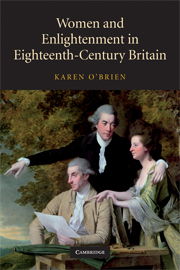Book contents
- Frontmatter
- Contents
- Acknowledgements
- Introduction: the progress of society
- 1 Anglican Whig feminism in England, 1690–1760: self-love, reason and social benevolence
- 2 From savage to Scotswoman: the history of femininity
- 3 Roman, Gothic and medieval women: the historicisation of womanhood, 1750–c.1804
- 4 Catharine Macaulay's histories of England: liberty, civilisation and the female historian
- 5 Good manners and partial civilisation in the writings of Mary Wollstonecraft
- 6 The history women and the population men, 1760–1830
- Notes
- Bibliography
- Index
3 - Roman, Gothic and medieval women: the historicisation of womanhood, 1750–c.1804
Published online by Cambridge University Press: 04 September 2009
- Frontmatter
- Contents
- Acknowledgements
- Introduction: the progress of society
- 1 Anglican Whig feminism in England, 1690–1760: self-love, reason and social benevolence
- 2 From savage to Scotswoman: the history of femininity
- 3 Roman, Gothic and medieval women: the historicisation of womanhood, 1750–c.1804
- 4 Catharine Macaulay's histories of England: liberty, civilisation and the female historian
- 5 Good manners and partial civilisation in the writings of Mary Wollstonecraft
- 6 The history women and the population men, 1760–1830
- Notes
- Bibliography
- Index
Summary
James Dunbar's work provides an instance of the ways in which Scottish conjectural history gave rise to broader, less systematic investigations of ‘manners’. Dunbar treated manners, as did many later eighteenth-century writers, not so much as a feature of particular economic stages, but more as a manifestation of the cultural or ethnic personality of a society, transmitted within families and often at odds with, or resistant to, the modernising processes of history. This chapter examines the diversification of the Scottish study of manners, both north and south of the border, into questions of cultural and ethnic heritage in ways that enlarged the scope of conjectural history, but that also loosened it from its original moorings in natural law and political economy. Some of those who contributed new work on manners, notably Edward Gibbon, gave greater cultural depth to the Scottish account of the progress of society in Europe. Some took a sceptical approach to the very notion of ‘progress’, and explored the manners of ancient European cultures (as, to some extent, Adam Smith and Adam Ferguson had done), and drew attention to those features of society, such as spontaneous creativity, martial independence and respect for female courage, which were lost or rendered obsolete in the process of modernisation. Many of the later eighteenth-century writings on manners were diffuse and anecdotal, but almost all continued to give weight, similar to that of the Scottish conjectural histories, to the status and role of women.
- Type
- Chapter
- Information
- Women and Enlightenment in Eighteenth-Century Britain , pp. 110 - 151Publisher: Cambridge University PressPrint publication year: 2009



